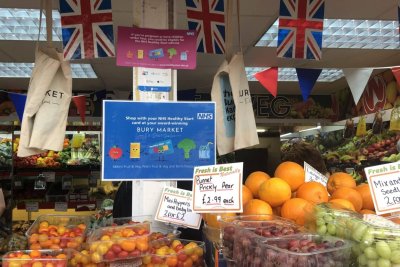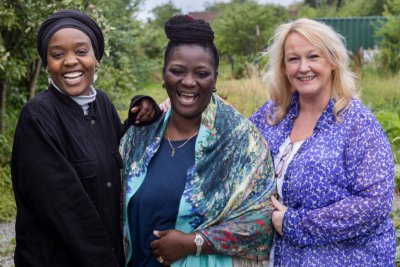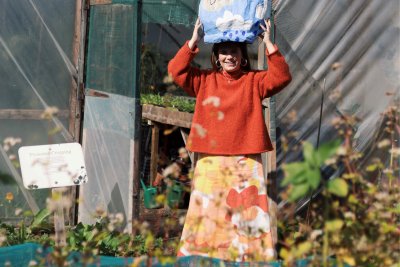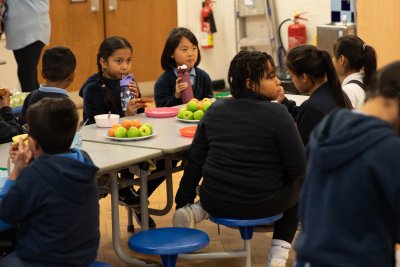Land for food growing: a little less conversation a little more action
In this guest blog, Glasgow Community Food Network (GCFN) Chair Abi Mordin outlines current land opportunities in Glasgow and how the City Council can connect these to food policy commitments.
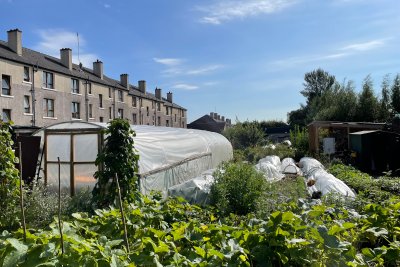
Urban and peri-urban agriculture has never had so much attention in the move towards sustainable food systems change. Some of us who have been doing this work for a long time, have known for ages that it's a key solution. However, it's now getting the attention it deserves. Research paper after research paper shows that food production in our cities, in a multitude of different ways, is a major contributor to resilient led food systems.
In Glasgow, we have enjoyed being part of Sustain’s Fringe Farming project during 2021 and we're looking forward to following up the action plan set out in the Glasgow Fringe Farming briefing in 2022. Involvement in this project has helped us in Glasgow to raise the profile of urban and peri-urban food production higher up the political agenda.
We’ve got some incredible opportunities in Glasgow. In May 2021, we signed off the Glasgow City Food Plan. This incredible 76 Point Action Plan was co-created by around 80 stakeholder organisations. It covers themes such as food procurement, food economy, environment and food waste, food poverty, community food, and children and young people. It provides a pathway and route map towards a healthy, equitable and sustainable food city.
Increasing urban food production pops up as an action across many themes and is crucial in the quest towards the food city that we want to see. However, many barriers still exist to achieving our goals.
Access to land remains the foremost barrier. Like all local authorities in Scotland, Glasgow has written, prepared and launched their Food Growing Strategy. This is a duty on all local authorities under the Community Empowerment Act 2015. Broadly speaking, it means that local authorities have to support communities to access to land for community gardens and allotments.
Glasgow has also made a commitment to supporting the development of community- led market gardens. Glasgow's Food Growing Strategy is a great document. However, despite being signed off in April 2020, we have yet to see much progress on delivery. We all know how slowly councils can move, and how cumbersome the bureaucratic processes can be. But as communities we were hoping to see a bit more action and a little less conversation by now. Nonetheless, the Food Growing Strategy remains a key ingredient in increasing urban food production in Glasgow.
However, despite being signed off in April 2020, we have yet to see much progress on delivery. We all know how slowly councils can move, and how cumbersome the bureaucratic processes can be. But as communities we were hoping to see a bit more action and a little less conversation by now.
Glasgow City Council is also currently quite keen to dispose of some of its assets. This includes former sports grounds such as football pitches and golf courses. Controversially, it also includes community centres that have previously been council run. We have had an opportunity in Glasgow to submit a proposal to take on a golf course in the north of the city. We worked collaboratively with another three organisations looking at how this site could be used from an agro ecological perspective. Initially, the asset transfer team in the Council were very positive to our approach. Yet we're now being told that it's not strategic enough. We wonder how a mixed use agroecological community-engaged project could not be strategic in the times that we live in. With a backdrop of climate change, soaring cost of living and food poverty, and a two-year pandemic, surely an agroecological approach is exactly strategic enough?
Additionally, we are quite keen to talk to the council more about its former plant nursery site in the south-east of the city. This large site is a mixture of open greenspaces, a SSSI water meadow and native broadleaf woodlands. Until very recently, it also had 13 glass houses and 11 Polytunnels on site. However, these have just been removed. We have been told since 2014 that this site is being ‘held for development’. Repeated requests to the council to have a more in-depth conversation about what this could look like as a community- run market garden or farm have so far come to nothing.
Glasgow has a huge amount of vacant and derelict land. As a former industrial city, many areas of the city are contaminated. This provides opportunities but also challenges to creating food growing spaces. Furthermore, unlike other local authorities elsewhere in the UK, Glasgow does not have a portfolio of farms under its jurisdiction; the local authority area of the city stops out just at the edge of the urban areas. So, accessing land and green spaces outside of the city boundaries means engaging with an additional four or five other local authorities. This makes that particular pathway quite difficult to pursue. Despite policy commitments being in place in several council strategies, the clear opportunities to progressing these commitments are hindered by the council’s own barriers.
Glasgow has a huge amount of vacant and derelict land. As a former industrial city, many areas of the city are contaminated. This provides opportunities but also challenges to creating food growing spaces.
The need for increased urban agriculture and peri- urban agriculture has been shown time and time again. Not just nationally, but specifically in Glasgow. In 2018 Glasgow Community Food Network along with Propagate carried out the Roots to Market research. This spoke to around 25 people who wanted to be or are urban market gardeners, and also to around 20 cafes and restaurants across the city who were very keen to access locally sourced produce. So, since 2018, we've had a series of recommendations and asks aimed at enabling growers to access land.
There are also several quite exciting and successful projects and enterprises already up and running that demonstrate the need for more urban food production. These include groups and collectives such as the The Wash House Garden in the east end of the city, and Tenement Veg who have been trying to find a secure site for many years, and have spent each growing season in a different place since they started up.
One of the foremost successful sustainable food social enterprises of the city is Locavore. Locavore run several sustainable and locally sourced greengrocers, in addition to a large-scale box scheme, now serving around 2000 customers. Locavore have managed to strike up a partnership with a farm outside Glasgow where they have a market garden occupying around five acres. They have also taken on a couple of former nursery sites, however, these are on unstable leases which has inhibited development and increased food production.
The skills gap as a barrier to increasing urban and peri-urban agriculture was highlighted by Fran Halsall (ShefFood) in her recent blog. Certainly, there are very few opportunities to learn market gardening skills without volunteering. Horticultural courses are run in several Glasgow colleges, however these focus on amenity horticulture rather than food production.
Communities often provide innovative approaches to food education. The organisation Central and West Integration Network works primarily with asylum seekers and refugees. They recently ran a project in partnership with Glasgow Community Food Network which engaged around 15 Women from minority ethnic backgrounds on a programme of agroecological learning. The women had opportunities to learn and share their skills in everything from milking goats, to baking bread, to market gardening, and how to run a successful enterprise. However, these exemplary projects are by their nature short term and dependent on external funding sources.
Improving food education offering is one of the cross thematic actions in the Glasgow City Food Plan. This extends to all types of food education, but crucially must include better learning opportunities for people to pursue careers as market gardeners and growers.
Looking ahead, Glasgow Community Food Network will be working with key partners such as Glasgow Allotments Forum on the Land for Growing campaign. Recent funding from Sustainable Food Places through the Food for the Planet campaigns grant will enable several events to take place throughout the year and a real push on the actions and asks In the City Food Plan particularly around urban agriculture. We will continue to facilitate an Urban Agriculture Working Group. This working group will be initially those invited to the Glasgow Fringe Farming workshop held earlier in 2021. This group will monitor the actions and commitments to urban agriculture in the City Food Plan and ensure that they are implemented.
The commitments made to the Glasgow City Food Plan must be honoured. We want to see more locally sourced and sustainably produced foods in procurement. We want to see more joined up working between hospitality and food economy and urban growers. And we really want to make sure that locally sourced and sustainably produced food is affordable and accessible to low-income communities across the city. To achieve this, we urgently need improved access to land for innovative, forward-thinking agroecological urban food production. Let’s see more moves from fine words in policy to real action.
Check out the Glasgow Fringe Farming briefing to read recommended policy and action to develop resilient food economies through peri-urban agroecology in Glasgow.
Published Wednesday 19 January 2022
Fringe Farming: The Fringe Farming project is a collaboration with partners across the UK to understand barriers, identify land opportunities and local actions, and develop national policy to enable agroecological farming at the edge of cities as part of a green economic recovery.

